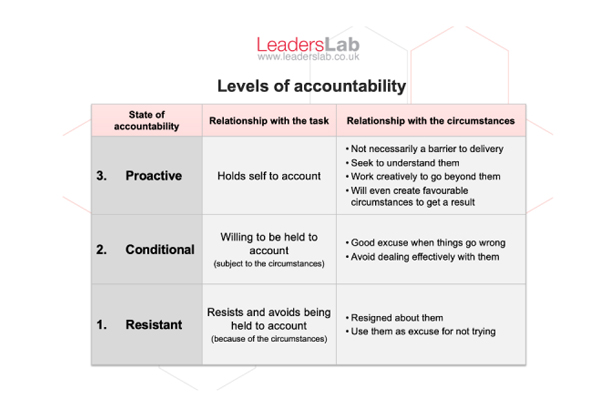Let’s face it – managing people can feel like herding cats, especially when everyone seems to have a different idea of what “accountability” actually means. Maybe you’ve worked hard on your own leadership skills (see Can we count on you?) but find yourself asking, What about everyone else? Why can’t they just step up?
People operate at different levels of accountability. Understanding this is the key to managing them effectively. Let’s break it down.
Level 1: The Resistant Ones
These are the people for whom excuses come naturally. Managing them is all about challenging their relationship with the circumstances, not just the excuses.
Take Peter, for example.
Peter was a senior director who was consistently late to board meetings, always armed with a plausible excuse about traffic. The rest of the team managed to be on time, despite their equally demanding schedules.
So, I asked Peter, “Do you ever go on holiday?”
“Of course,” he said, looking bemused.
“And do you ever fly from Heathrow?”
“Yes,” he replied cautiously.
“Well,” I asked, “how many times have you missed your flight?”
His silence said it all. Peter realised he was prioritising his colleagues lower than his own personal plans. Once that clicked, he turned up on time without fail.
Key takeaway: Resistance at Level 1 often stems from misplaced priorities. Help them see the bigger picture – and hold them accountable for their choices.
Level 3: The Dream Team
Level 3 people are the gold standard of accountability. They take ownership, meet deadlines, and rarely need supervision. In fact, managing them can feel like a dream – almost too good to be true.
Case in point
A star performer on our support team consistently goes above and beyond. Send her an email at night, and by morning, it’s done. (We’ve learned to avoid this because we feel guilty for intruding on her downtime!)
She operates with a clear focus: It’s faster to do it now than to procrastinate or make excuses.
Key takeaway: For Level 3 performers, all you need to do is provide clarity, then step aside.
Level 2: The Real Challenge
And then there’s Level 2—the conditionally accountable. These people nod enthusiastically when asked to do something but rarely deliver on time (or at all). Their resistance is more subtle, often hiding behind excuses like “I shouldn’t have to chase others to get this done.”
What they haven’t grasped is that accepting a task means owning every part of it – even the messy bits like managing dependencies.
Here’s how to shift this mindset:
- Point out that “No” is an option. For many, the thought of outright refusal is more uncomfortable than working out how to deliver on their promise.
- Make them consider the full commitment before saying yes. A clear yes – or no – is far easier to manage than a half-hearted maybe.
Key takeaway: Level 2 resistance requires coaching and clarity. Teach them that accountability means owning the whole process, not just their piece of it.
How to Lead by Example
If you’re going to talk the talk, you’d better walk the walk. Accountability starts with you.
Here’s how:
- Own your level of accountability. Are you really operating at Level 3? Or do you slip into Level 2 or 1 when things get tough?
- Say no when necessary. A clear no is far more professional than an unreliable yes.
- Demand clarity. From yourself and others. Avoid vague commitments, and insist on clear agreements from your team.
- Train and support. If someone struggles with accountability, help them develop the skills to improve.
Build a Culture of Accountability
Accountability isn’t just a personal habit; it’s a team value. If you want people to own their commitments, you need to create an environment that supports it.
Set the tone:
- Make it explicit: “This is how we work here. No excuses, no collusion.”
- Role model accountability and expect the same from your team.
- Reward those who step up, and address behaviours that don’t align with the culture.
Final Thoughts
Accountability doesn’t just make your life easier – it transforms the entire team. When everyone knows their role, owns their commitments, and delivers on their promises, the results speak for themselves.
So, challenge yourself to lead with clarity and integrity. The rest of your team will follow – and thank you for it.
Are you ready to create a culture of accountability?
